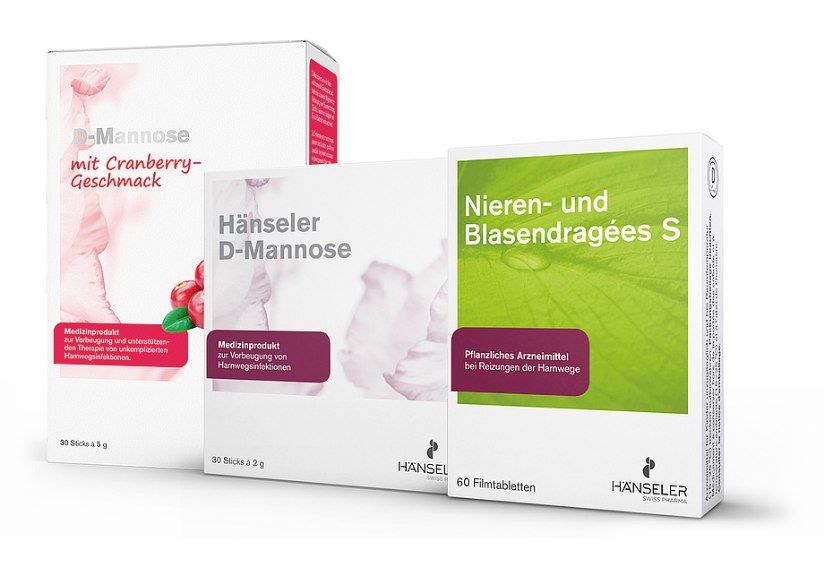Tips from doctors and specialists

Florian Meier,
Adler Pharmacy Winterthur
How to get rid of the inflammation: Florian Meier from the Adler pharmacy in Winterthur explains why bladder inflammation is a troublesome, constantly recurring companion for many women and what alternatives there are to antibiotics.
Florian Meier from the Adler pharmacy in Winterthur explains why bladder infections are a mühsamer, constantly recurring companion for many women and what alternatives there are to antibiotics.
A urinary tract infection is an infection of the urinary tract organs, which is usually caused by bacteria. The bacteria get to the external urinary tract through smear infections, i.e. through contact, and then migrate up the urinary tract. If the bacteria have arrived in the urinary bladder, one speaks of a bladder inflammation or a so-called cystitis.
If the inflammation remains untreated for a long time, the bacteria can ünnen via the upper urinary tract up to the kidney, where they trigger a renal pelvic inflammation üsen. The germs can either originate from the body's own intestinal flora or be transmitted by the partner during sexual intercourse. Women are much more frequently affected by cystitis than men. This is because their urinary cycle is much shorter than that of a man, which means that the bacteria have to travel a much shorter distance to settle in the bladder. Inflammation of the urinary tract can often go unnoticed unless it reaches the bladder and produces symptoms.
However, adults usually experience a painful or burning sensation when urinating as well as urinary urgency without urination. As soon as the infection reaches the urinary bladder, often a painful feeling of the lower abdomen is added. However, what is not among the symptoms of such an infection is vaginal itching or discharge. If the upper urinary tract or the renal pelvis are also affected, fever and severe pain may occur. However, even if these symptoms occur in an attenuated form, a urinary tract infection can usually be recognized by the fact that the urine is cloudy or discolored and has a pungent, üsmell.
In some cases, there may even be blood in the urine. In addition, bacteria and white blood cells are detectable in the urine.
Often, a bladder infection can simply disappear within two to three weeks with regular toilet use, even without special treatment. However, since the bacteria can spread to the kidney, it is usually not recommended to do anything. If you don't want to go to the doctor about it right away, there are some very good home remedies. However, it is important to know that they can certainly shorten a bladder infection and alleviate the symptoms, but there is no certainty that they work for everyone and the infection thereby disappears completely.
At Adler Pharmacy, we recommend that patients drink plenty of fluids on a regular basis. It is one of the best and most proven home remedies because it flushes the bacteria out of the bladder. It should be at least two liters per day, avoiding alcohol, coffee and citrus, as these drinks can irritate the bladder. Drinking and spitting out a lot also includes not avoiding going to the bathroom, even if it is uncomfortable.
Very important is also a thorough and correct hygiene of the intimate area. After urinating, care should be taken to wipe from front to back and not vice versa, otherwise the bacteria of one's own intestinal flora will reach the urinary tract. In addition, it is important to find a certain balance in daily hygiene: A too infrequent body hygiene favors the settlement as well as the growth of bacteria, while too extensive showering destroys the natural acidic barrier of the vagina, which normally prevents the penetration of germs.
We also recommend Sitzbäder, whereby you sit up to the hüfte in about 36 °C warm water, which has been enriched with an infusion of horsetail, chamomile or sage.
Then hot water is added until the bath has a temperature of about 41 °C. More generally, Wärme in the form of Wärmflaschen or heating pads on the lower abdomen helps to relieve pain. Last but not least, there are some herbs and berries that have antibacterial or diuretic properties and make excellent teas. Bärentraubenblätter act especially in the area of the bladder and the urinary tract germs and inflammation counteract and have therefore proven particularly effective.
Juniper has particularly diuretic properties and is therefore ideal for expelling a bladder inflammation suitable.
In addition, there are extra kidney and bladder teas or – very pleasant to take – dragées, which include many such medicinal plants as well as birch leaves, nettle, süssholz and others. Cranberry juice can also help reduce the spread of infection, as the active ingredient proanthocyanidin makes it harder for bacteria to adhere to the walls of the urinary tract. Blueberries as well as cranberries also have this active ingredient.
Source: So you get rid of the inflammation, Florian Meier, consultation Dr. Stutz, 12.2014
More voices from &physicians & specialists
.
Protection für the bladder
Pharmacist Samuel Knüsel über D-mannose as a natural alternative to antibiotics
read more
Phytopower instead of antibiotics
Marlies von Siebenthal, head specialist for bladder and intimate complaints at the Frauenfeld Cantonal Hospital, says how many bladder infections can be treated without antibiotics
read more
Putting an end to bladder infections
PD Dr. Daniele Perucchini explains the effects of D-mannose, a natural, gentle remedy to prevent recurrent bladder infections
read moreThe Natural Response to Bladder Infections
Are you sick to death of irritating bladder infections and antibiotics? We have two natural remedies, pure D-mannose and kidney and bladder dragées from three medicinal plants that help.
Bladder inflammation is a troublesome story in women. An infection is often followed by the next one – along with a new antibiotic prescription. There are gentle alternatives. One is pure D-mannose. The simple sugar attaches to the bacteria and prevents them from settling in the bladder wall. In one study, mannose has been well studied for preventing bladder infections. Compared with an antibiotic, mannose performed equally well or even better. With no side effects or development of resistance like an antibiotic

